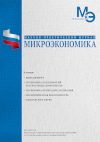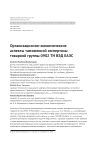Organizational and economic aspects of the customs examination of the commodity group 0902 of the customs code of the EAEU
DOI: 10.33917/mic-2.115.2024.62-74
The organizational and economic aspects of customs examination of commodity group 0902 of the EAEU TN FEA in modern conditions are considered. Features of the classification of tea and products made from it (commodity group 0902 of the EAEU HS) include the possibility of classifying a drink with the trade name «tea» to other groups of the HS. It is shown that the main data for correctly determining the HS code of a drink with the trade name «tea» are the degree of fermentation, composition and type, weight of packaging and purpose of the product. It has been established that in order to effectively identify tea and reduce the risk of erroneous classification under the Commodity Nomenclature of Foreign Economic Activity, it is necessary to improve existing identification technologies and regulatory documents for tea classification. It is substantiated that organizational and economic measures taken by the state to support the tea industry bring appropriate results, but complete import substitution of a drink with the trade name «tea» is practically impossible. Only partial import substitution is acceptable – this is the active development of the Russian industry for the production of fireweed (angustifolia fireweed).
References:
1. Bezpalov V.V., Filatov V.V., Zharikov R.V., Karev M.V. Features of customs regulation of imports of food and processing industry goods imported into the territory of the Russian Federation. Applied economic research. 2023;1:8–18. (In Russ.).
2. Alekseeva E.V. Ivan-narrow-leaved tea, a forgotten miracle of nature. Problems of the environment and natural resources. 2020;7:163–167. (In Russ.).
3. Babkina N.A. Commodity science, expertise in customs and commodity nomenclature of foreign economic activity. Amur State University, Blagoveshchensk. 2017. 230 p. (In Russ.).
4. Bikbulatova E., Plotnikova N.A. «Koporsky» fermented tea from the leaves of willow-leaved tea and Canadian maple. In the collection: Ecology and nature management: applied aspects. VI International Scientific and Practical Conference. 2016. pp. 63–65. (In Russ.).
5. Vaitekhovich A.A. The conjuncture of the tea market on a global scale. In the collection: Organizational and legal support of the management mechanism in the field of agribusiness. 2019. pp. 159–161. (In Russ.).
6. Vorontsov P.A., Dzik L.R., Zemlyakova E.S. Studies of black tea of different brands and assessment of its quality. Bulletin of Youth Science. 2021;5 (32). (In Russ.).
7. Gamidullaev S.N., Nikolaeva S.L., Zakharenko T.A., Simonova V.N. Commodity science and expertise in customs. St. Petersburg: Troitsky Bridge, 2010. 400 p. (In Russ.).
8. Dengina Yu.V., Tyulkina A.A., Darovskikh L.V. Research of some indicators of tea quality from different manufacturers. In the collection: Biodiagnostics of the state of natural and man-made systems. Materials of the XIV All-Russian scientific and Practical conference with international participation. 2016. pp. 375–378. (In Russ.).



